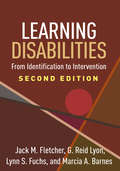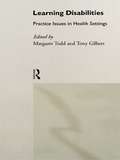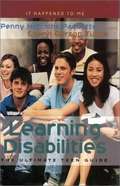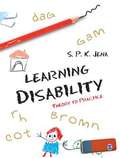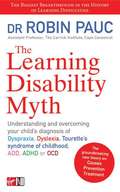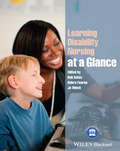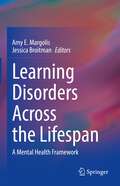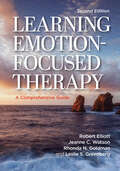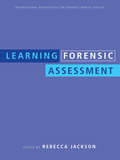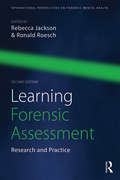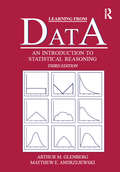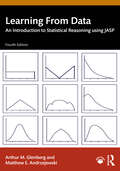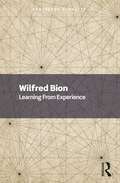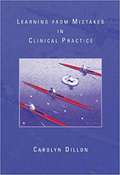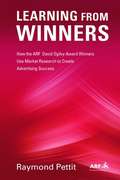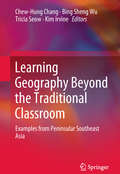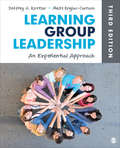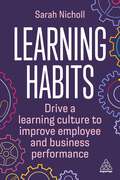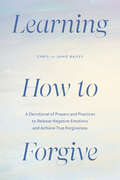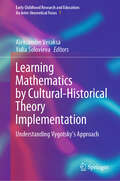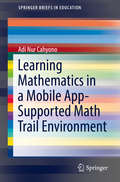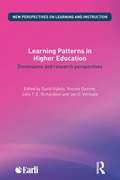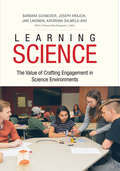- Table View
- List View
Learning Disabilities, Second Edition: From Identification to Intervention
by Marcia A. Barnes G. Reid Lyon Jack M. Fletcher Lynn S. FuchsReviewing the state of the science of learning disabilities (LDs) and describing effective educational practices, this authoritative volume has been significantly revised and expanded with more than 70% new material. Foremost LD experts identify effective principles of assessment and instruction within the framework of multi-tiered systems of support (MTSS). With a focus on what works in the classroom, the book explores the full range of reading, mathematics, and writing disabilities. It synthesizes knowledge from neuropsychology, cognitive neuroscience, and special and general education. Illustrations include eight color plates. As a special supplement, a chapter on the history of the LD field from the first edition is provided at the companion website. New to This Edition *Heightened emphasis on intervention, including significant new developments in reading comprehension and math. *Reflects major scientific advances in understanding LDs. *Chapter on principles of effective instruction and MTSS. *Chapter on automaticity in reading, math, and writing. *Chapter on challenges in real-world implementation of evidence-based practices. *Chapter on the validity of the LD construct.
Learning Disabilities: Educational Principles and Practices
by Doris J. Johnson Helmer R. MyklebustFocuses on practical solutions to educational problems involving spoken language, reading, writing, arithmetic, & nonverbal disorders, making this book a timeless reference for all who desire a thorough understanding of learning.
Learning Disabilities: Practice Issues in Health Settings
by Margaret Todd Tony GilbertLearning Disabilities raises issues which are of crucial importance to all health care professionals and students who work with people with a learning disability. The authors, senior nurse teachers and practitioners in the field, examine these issues, and the theoretical concepts underpinning them, from a practical perspective. They show how complex and interconnecting ideas such as consumerism and choice, control and empowerment, informed choice and professional power can be applied with real understanding. Learning Disabilities includes* introductions and explanations of key concepts* practical guidelines for care delivery* detailed case studies* useful summaries of key points
Learning Disabilities: The Ultimate Teen Guide
by Penny Hutchins Paquette Cheryl Gerson TuttleWritten for adolescents confronting learning disabilities, this book provides an overview of the most common disabilities and offers advice on overcoming the difficulties associated with them. Medical aspects of the disabilities are covered and celebrities with similar conditions are profiled. Assistive technology is described, and advice is offered concerning advocacy. Paquette is an educational writer; Tuttle is a special education coordinator. Annotation (c)2003 Book News, Inc., Portland, OR (booknews.com)
Learning Disability
by S P JenaIn spite of their average or even above-average intelligence and conventional classroom experience, a large number of children suffer from learning disabilities. Failing to cope with the academic demands of the school, many of them drop out at an early age. This deprives them of many opportunities in life that a literate person enjoys. In this context, this book serves two major objectives: it provides up-to-date information to the readers on theories and current practices in remediation of learning disability, and demonstrates the therapeutic effectiveness of two major techniques of intervention, namely, cognitive behaviour therapy and computer-assisted instruction, through a series of case studies. Thus, it bridges the theory-practice gap originating out of the difference between fundamental research and its actual implementation and places the treatment programmes on a firmer scientific footing by validating them empirically.
Learning Disability Myth
by Robin PaucDr. Robin Pauc argues that children diagnosed with dyspraxia, dyslexia, ADD, ADHD, OCD and Tourette's syndrome essentially come from a development path known as apoptosis. Pauc provides help with treating syndromes and guides parents to work with their doctors to help their children.
Learning Disability Nursing at a Glance
by Jo Welch Debra Fearns Bob GatesLearning Disability Nursing at a Glance is the perfectcompanion for study and revision from the publishers of themarket-leading at a Glance series. This visual, dynamic anduser-friendly resource addresses the key principles underpinningcontemporary learning disability nursing practice, relates them tokey clinical practice issues, and explores them in the context ofmaintaining health and well-being. Exploring the full spectrum of care, this textbook addresses theneeds of people with learning disabilities across the life span,from children through to adolescents and on to adults and olderpeople. Aimed at nursing, health and social care students, as wellas registered nurses, this is an invaluable resource for all thoselooking to consolidate and expand their knowledge, in order toprovide safe, effective and compassionate care to people withlearning disabilities.The perfect revision and consolidation textbookHighly visual colour presentation, with full colourillustrations throughoutIncludes expert contributions from learning disability academicstaff as well as cliniciansEmbraces both primary and secondary care perspectivesSupported by a companion website featuring case studies tofurther test your knowledgeAvailable in a range of digital formats- perfect for 'onthe go' study and revision
Learning Disorders Across the Lifespan: A Mental Health Framework
by Jessica Broitman Amy E. MargolisThis book addresses the need to view specific learning disorders (SLDs) within a mental health framework, as supported by their placement alongside autism spectrum disorder (ASD) and attention deficit hyperactivity disorder (ADHD) in the Diagnostic and Statistical Manual of Mental Disorders, Fifth Edition (DSM-5). It describes how policy and practice point to a different perspective – specifically that SLDs are often treated as educational rather than psychological problems – and examines the implications of this dichotomy. The book reviews empirical research that suggests children need access to treatment for clinical components of SLDs that may respond to psychological intervention separately from, and in addition to, educational interventions. It provides a theoretical framework for organizing research findings and clinical perspectives that support understanding the clinical components of SLDs and addresses the need for a mental health framework within which to approach theory, treatment, and assessment of SLDs.Key areas of coverage include:Examining different theoretical orientations to learning disorders (e.g., cognitive, behavioral, neuropsychoeducational, psychoanalytic).Adapting evidence-based therapeutic techniques for use with children and adolescents who have learning disorders.The need for accurate and well characterized assessment of SLDs.How incorporating a cognitive neuroscience perspective into assessment can move LD treatment and research forward.Learning Disorders Across the Lifespan is an essential reference for clinicians, therapists, and other professionals as well as researchers, professors, and graduate students in school and clinical child psychology, special education, speech-language therapy, developmental psychology, pediatrics, social work as well as all interrelated disciplines.
Learning Emotion-Focused Therapy: A Comprehensive Guide
by Leslie S. Greenberg Jeanne C. Watson Robert Kingwill Elliott, Jr. Rhonda N. GoldmanUpdates a classic emotion-focused therapy reference with over 20 years of research and theory. The first edition of this book became the standard reference and training work for a generation of emotion-focused therapy (EFT) practitioners. This second edition aims to inspire a new generation of emotion-focused therapists by offering fully updated coverage of EFT theory and practice, alongside the most exciting theoretical, practical, and organizational developments of the past 20 years. Updates to this new edition include: New integrated models of emotional deepening and EFT case formulation, New questions and activities for self‑reflection, Deepened theoretical formulations of the nature and functions of emotions such as anger and shame, A comprehensive review of the existing research base in EFT, and A supplemental website with an editable sample syllabus to enhance teaching and training (see https://www.apa.org/pubs/books/learning-emotion-focused-therapy-second-edition). In EFT, therapists cultivate a deeply empathic, caring presence. They follow their client&’s lead while delivering gentle, flexible guidance. The goal is to facilitate a process of emotional deepening in clients as they progress from global distress to an acceptance of core pain, enabling them to emerge with a new perspective through useful, adaptive emotions.
Learning Forensic Assessment
by Rebecca JacksonProviding an excellent resource for forensic psychology undergraduate students, this book offers students the opportunity to learn from experts, through the collection of outstanding articles. Unlike other books in the area that are topic specific, it also gives them comprehensive coverage of the subject. Divided into five broad topic areas, it covers: professional issues juvenile assessment criminal forensic assessment civil forensic assessment pervasive issues – malingering and psychopathy. Written by a group of internationally renowned contributors and including didactic information as well as providing discussions on practical issues regarding assessment and assessment instruments, this textbook will be invaluable reading for all students of forensic psychology.
Learning Forensic Assessment: Research and Practice (International Perspectives on Forensic Mental Health)
by Rebecca Jackson and Ronald RoeschMajor developments in the field since the publication of Learning Forensic Assessment are integrated in this revised edition, including revised editions of the DSM-5, HCR-20 scale, and child custody guidelines. This textbook is designed for graduate students learning forensic assessment and psychologists coming to forensic practice later in their careers. It is organized around five broad areas: Professional and Practice Issues, Adult Forensic Assessment, Juvenile Forensic Assessment, Civil Forensic Assessment, and Communicating Your Findings. Each chapter begins with a strong teaching and learning foundation. The latter part of each chapter is assessment specific, covering available assessment measures and approaches to assessment. The authors go well beyond simple descriptions of assessment measures and provide a conceptual discussion of the evaluation process that helps the reader understand how assessment measures fit into the overall evaluation process. The evaluation component is geared toward assessing the important aspects of the construct as laid out in the early part of each chapter. Each chapter then concludes with a case example to illustrate the measures and techniques described.
Learning From Data: An Introduction To Statistical Reasoning
by Arthur Glenberg Matthew AndrzejewskiLearning from Data focuses on how to interpret psychological data and statistical results. The authors review the basics of statistical reasoning to helpstudents better understand relevant data that affecttheir everyday lives. Numerous examples based on current research and events are featured throughout.To facilitate learning, authors Glenberg and Andrzejewski: Devote extra attention to explaining the more difficult concepts and the logic behind them Use repetition to enhance students’ memories with multiple examples, reintroductions of the major concepts, and a focus on these concepts in the problems Employ a six-step procedure for describing all statistical tests from the simplest to the most complex Provide end-of-chapter tables to summarize the hypothesis testing procedures introduced Emphasizes how to choose the best procedure in the examples, problems and endpapers Focus on power with a separate chapter and power analyses procedures in each chapter Provide detailed explanations of factorial designs, interactions, and ANOVA to help students understand the statistics used in professional journal articles. The third edition has a user-friendly approach: Designed to be used seamlessly with Excel, all of the in-text analyses are conducted in Excel, while the book’s CD contains files for conducting analyses in Excel, as well as text files that can be analyzed in SPSS, SAS, and Systat Two large, real data sets integrated throughout illustrate important concepts Many new end-of-chapter problems (definitions, computational, and reasoning) and many more on the companion CD Online Instructor’s Resources includes answers to all the exercises in the book and multiple-choice test questions with answers Boxed media reports illustrate key concepts and their relevance to realworld issues The inclusion of effect size in all discussions of power accurately reflects the contemporary issues of power, effect size, and significance. Learning From Data, Third Edition is intended as a text for undergraduate or beginning graduate statistics courses in psychology, education, and other applied social and health sciences.
Learning From Data: An Introduction to Statistical Reasoning using JASP
by Arthur M. Glenberg Matthew E. AndrzejewskiThis fully updated fourth edition explores the foundations of statistical reasoning, focusing on how to interpret psychological data and statistical results. This edition includes three important new features. First, the book is closely integrated with the free statistical analysis program JASP. Thus, students learn how to use JASP to help with tasks such as constructing grouped frequency distributions, making violin plots, conducting inferential statistical tests, and creating confidence intervals. Second, reflecting the growing use of Bayesian analyses in the professional literature, this edition includes a chapter with an introduction to Bayesian statistics (also using JASP). Third, the revised text incorporates adjunct questions, that is, questions that challenge the student’s understanding, after each major section. Cognitive psychology has demonstrated how adjunct questions and related techniques such as self-explanation can greatly improve comprehension.Additional key features of the book include:• A user-friendly approach, with focused attention to explaining the more difficult concepts and the logic behind them. End of chapter tables summarize the hypothesis testing procedures introduced, and exercises support information recall and application.• The consistent use of a six-step procedure for all hypothesis tests that captures the logic of statistical inference.• Multiple examples of each of the major inferential statistical tests.• Boxed media reports illustrate key concepts and their relevance to real-world issues.• A focus on power, with a separate chapter, and power analysis procedures in each chapter.With comprehensive digital resources, including large data sets integrated throughout the textbook, and files for conducting analysis in JASP, this is an essential text for undergraduate or beginning graduate statistics courses in psychology, education, and other applied social and health sciences.
Learning From Experience (Routledge Classics)
by Wilfred R BionWilfred R. Bion was one of the foremost psychoanalysts of his generation, whose work has shaped and enriched psychoanalysis and psychotherapy indelibly. Renowned for some highly original and sometimes cryptic ideas, such as the alpha function and theory of the grid, Learning from Experience is arguably his most important and enduring work. Bion brings knowledge into the psychoanalytic spotlight. What forces, he asks, interfere with knowledge? Crucially, Bion doesn't mean knowing only facts, but the lifelong process of understanding and coming to know things that is a consequence of the development of knowledge. However, Learning From Experience is perhaps best-known for its emphasis on the way emotion and knowledge are interwoven. Bion links the emotional capacity to develop and know to the capacity to tolerate frustration: if we can hold ourselves in check whilst we endure frustration, then we can come to know things. A remarkable and brilliant work by a fascinating psychoanalyst and thinker, Learning From Experience continues to inspire psychoanalysis and psychotherapy. This Routledge Classics edition includes a new Foreword by Robert Hinshelwood.
Learning From Mistakes In Clinical Practice
by Carolyn DillonThis text is a virtual handbook of classic mistakes to anticipate, work through, and grow from. It identifies, discusses and re-frames classic mistakes that beginning interviewers and clinicians are likely to make in practice by illuminating a myriad of mistakes through the use of first-hand vignettes, in-text exercises, and a systems framework. This book uses a strengths-perspective, and can serve as a companion text or as a stand-alone primer because of its elaboration of the phases, principles, strategies and methods used in the helping process.
Learning From Winners: How the ARF Ogilvy Award Winners Use Market Research to Create Advertising Success
by Raymond PettitThis book demonstrates how the best companies use the creative application of research, done up front, to produce the big ideas with significant impact on the market and on the people, employees, partners, retailers and customers. Readers of this book will experience how brand managers and their agencies use the right research to drive new brand in
Learning Geography Beyond the Traditional Classroom: Examples From Peninsular Southeast Asia
by Chew-Hung Chang Bing Sheng Wu Tricia Seow Kim IrvineThis book provides a collection of critical pieces that support the idea that good teaching and learning of geography in fieldwork and using technology should consider the dimensions of curriculum design, instructional design and resource provision, as well as assessment for such learning activities. Further, it clearly describes the thinking, experiences and critical comments concerning two broad areas of learning outside the traditional classroom – in the field and with technology.
Learning Group Leadership: An Experiential Approach
by Dr Jeffrey A. Kottler Dr Matt Englar-CarlsonFocusing on how to conduct and lead groups in a variety of therapeutic settings, Learning Group Leadership: An Experiential Approach, Third Edition covers theory, process, leadership, ethics, special populations, and challenges as they relate to group work in a positive, realistic, and knowledgeable way. Jeffrey A. Kottler and Matt Englar-Carlson introduce important conceptual and practical information and then use activities, exercises, field study assignments, and personal application questions to help students apply concepts to their work and lives. The fully updated Third Edition brings concepts to life through “student voices” in every chapter, examples drawn from the authors’ combined 55-plus years of experience, and demonstration video content that contains sessions corresponding with every chapter. “This is the best book out there for introducing students to the complex world of groups. The text delivers what it promises in the title. It teaches counseling graduate students how to become solid group leaders (or—to be more precise—how to begin their journey in that direction), and it does this in a way that is positive, knowledgeable, and realistic.…The most impressive aspect of the material is the authors’ focus on the experiential approach (training students to be group leaders), combined with an accessible writing style, a lot of knowledge, and an enthusiastic attitude.” —Marilyn MacGregor, Western New Mexico University “It’s clear that the authors have a wealth of experience with counseling groups—information is conversationally presented and realistically discussed." —Marla J. Muxen, South Dakota State University “This book is very readable and clearly explains the points it makes using accessible examples which students can readily understand. Skills discussed can be appreciated and applied to whatever personal experience of facilitating groups the student already has; as such it is a text which ‘grows with the student.’” —Corinne Hutt Greenyer, University of Southampton
Learning Group Leadership: An Experiential Approach
by Dr Jeffrey A. Kottler Dr Matt Englar-CarlsonFocusing on how to conduct and lead groups in a variety of therapeutic settings, Learning Group Leadership: An Experiential Approach, Third Edition covers theory, process, leadership, ethics, special populations, and challenges as they relate to group work in a positive, realistic, and knowledgeable way. Jeffrey A. Kottler and Matt Englar-Carlson introduce important conceptual and practical information and then use activities, exercises, field study assignments, and personal application questions to help students apply concepts to their work and lives. The fully updated Third Edition brings concepts to life through “student voices” in every chapter, examples drawn from the authors’ combined 55-plus years of experience, and demonstration video content that contains sessions corresponding with every chapter. “This is the best book out there for introducing students to the complex world of groups. The text delivers what it promises in the title. It teaches counseling graduate students how to become solid group leaders (or—to be more precise—how to begin their journey in that direction), and it does this in a way that is positive, knowledgeable, and realistic.…The most impressive aspect of the material is the authors’ focus on the experiential approach (training students to be group leaders), combined with an accessible writing style, a lot of knowledge, and an enthusiastic attitude.” —Marilyn MacGregor, Western New Mexico University “It’s clear that the authors have a wealth of experience with counseling groups—information is conversationally presented and realistically discussed." —Marla J. Muxen, South Dakota State University “This book is very readable and clearly explains the points it makes using accessible examples which students can readily understand. Skills discussed can be appreciated and applied to whatever personal experience of facilitating groups the student already has; as such it is a text which ‘grows with the student.’” —Corinne Hutt Greenyer, University of Southampton
Learning Habits: Drive a Learning Culture to Improve Employee and Business Performance
by Sarah NichollA learning culture is essential to outperform the competition but how can Learning and Development (L&D) professionals achieve this? What habits do they need to develop in their workforce? Learning Habits is written by an author with over 20 years' experience using learning science to improve both business and employee outcomes. It explains what habits are necessary for an effective learning culture and how to develop them at individual, team and organizational levels. This book outlines each habit, explains what it is, why it makes a difference and how to measure it as well as providing a framework that can be used to make these habits become routine to ensure the learning sticks. Each habit is underpinned by behavioural science research and supported by practical advice, real world examples and case studies from global organizations. Learning Habits also includes checklists to track progress, a 'cue, routine, reward, reflect' model to make learning habits core to how the business operates and templates for measurement. This book is essential reading for all L&D practitioners who know that building a learning culture is crucial for individual and business success but don't know where to start.
Learning How to Forgive: A Devotional of Prayers and Practices to Release Your Negative Emotions and Achieve True Forgiveness
by Chris Bailey Jamie BaileyThe only Christian devotional on forgiveness offering weekly prayers and faith-based practices to heal and find a path toward a forgiving heart.Forgiveness isn&’t just a one-time decision, but a journey that none of us asked to go on. Whether you are wrestling with an offense, replaying painful memories, or don&’t know how to forgive and move forward, God is waiting and ready to lead you to the freedom that forgiveness offers. Through weekly devotions, prayers, and faith-based practices, Learning How to Forgive invites you to release pain to Him, process, and find a way forward. Authors and renowned Christian counselors Chris and Jamie Bailey use their professional and personal encounters of forgiveness to share encouraging messages of hope and assure you that God rejoices and dwells in a forgiving heart. Learning How to Forgive features: 52 WEEKS OF SUPPORTIVE DEVOTIONS: Relatable biblical messages and honest prayers to accompany you on your forgiveness journey SCRIPTURE VERSES FULL OF GOD&’S WISDOM: Carefully selected bible verses to comfort the wounded spirit FAITH-BASED EXERCISES FOR HEALING: Simple steps to draw you closer to the Lord and deepen your understanding of forgiveness through God&’s will and love PRACTICAL GUIDANCE: Skills to incorporate into everyday life instantly and easily to reroute negative and cyclical thoughts TRUSTED CHRISTIAN COUNSELORS: Chris and Jamie Bailey, trained and established Christian counselors of Expedition Marriage, share the healing, abundant joy, and love that comes with thriving in Christ.
Learning Mathematics by Cultural-Historical Theory Implementation: Understanding Vygotsky’s Approach (Early Childhood Research and Education: An Inter-theoretical Focus #7)
by Aleksander Veraksa Yulia SolovievaThis book is devoted to the topic of mathematical skills development, which was the focus of Vygotsky's cultural-historical theory. It offers descriptions of studies of development of visual modelling in children and its use for educational purposes. Special attention is given to concrete examples of Vygotsky’s work and educational programs that makes it possible to replicate the results in various settings. The work also addresses conditions, means and predictors of mathematical concepts acquisition at different ages and educational levels (preschool, primary and middle secondary education). The book shows theoretical solidity of cultural-historical approach and experience of its implementation in teaching of mathematical knowledge in childhood and the study of the process of psychological development.
Learning Mathematics in a Mobile App-Supported Math Trail Environment (SpringerBriefs in Education)
by Adi Nur CahyonoThis brief presents the results of a study on the development of the mobile app-supported math trail program for learning mathematics. This study is a part of the MathCityMap-Project, a project of the MATIS I Team from IDMI Goethe-Universität Frankfurt, Germany, that comprises math trails around the city that are supported by the use of GPS-enabled mobile phone technology. The project offers an activity that is designed to support students in constructing their own mathematical knowledge by solving the prepared mathematical tasks on the math trail and interacting with the environment, including the digital environment. The brief focuses specifically on the development of a model for a mobile app-supported math trail programme and the implementation of this programme in Indonesia. It offers both an empirical exploration of its implementation as well as critical assessment of students’ motivation in mathematics, their own performance, as well as teachers’ mathematics beliefs. It concludes with a future-forward perspective by recommending strategies for implementation in schools, among the general public of the existing math trails (including its supporting tool). It also discusses strategies for developing and designing new trails and suggests further research in other geographical regions and contexts for continued project development and implementation. Learning Mathematics in a Mobile App-Supported Math Trail Environment articulates an innovative and exciting future for integrating real mathematical tasks and geographic and digital environment into effective mathematics education.
Learning Patterns in Higher Education: Dimensions and research perspectives (New Perspectives on Learning and Instruction)
by John T. E. Richardson David Gijbels Jan D. Vermunt Donche VincentLearning Patterns in Higher Education brings together a cutting edge international team of contributors to critically review our current understanding of how students and adults learn, how differences and changes in the way students learn can be measured in a valid and reliable way, and how the quality of student learning may be enhanced. There is substantial evidence that students in higher education have a characteristic way of learning, sometimes called their learning orientation (Biggs 1988), learning style (Evans et al. 2010) or learning pattern (Vermunt and Vermetten 2004). However, recent research in the field of student learning has resulted in multi-faceted and sometimes contradictory results which may reflect conceptual differences and differences in measurement of student learning in each of the studies. This book deals with the need for further clarification of how students learn in higher education in the 21st century and to what extent the measurements often used in learning pattern studies are still up to date or can be advanced with present methodological and statistical insights to capture the most important differences and changes in student learning. The contributions in the book are organized in two parts: a first conceptual and psychological part in which the dimensions of student learning in the 21st century are discussed and a second empirical part in which questions related to how students’ learning can be measured and how it develops are considered. Areas covered include: Cultural influences on learning patterns Predicting learning outcomes Student centred learning environments and self-directed learning Mathematics learning This indispensable book covers multiple conceptual perspectives on how learning patterns can be described and effects and developments can be measured, and will not only be helpful for ‘learning researchers’ as such but also for educational researchers from the broad domain of educational psychology, motivation psychology and instructional sciences, who are interested in student motivation, self-regulated learning, effectiveness of innovative learning environments, as well as assessment and evaluation of student characteristics and learning process variables.
Learning Science: The Value of Crafting Engagement in Science Environments
by Barbara Schneider Joseph Krajcik Jari LavonenAn innovative, internationally developed system to help advance science learning and instruction for high school students This book tells the story of a $3.6 million research project funded by the National Science Foundation aimed at increasing scientific literacy and addressing global concerns of declining science engagement. Studying dozens of classrooms across the United States and Finland, this international team combines large-scale studies with intensive interviews from teachers and students to examine how to transform science education. Written for teachers, parents, policymakers, and researchers, this book offers solutions for matching science learning and instruction with newly recommended twenty-first-century standards.
